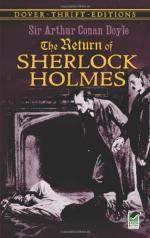“Why should the tramp burn the body?”
“For the matter of that, why should McFarlane?”
“To hide some evidence.”
“Possibly the tramp wanted to hide that any murder at all had been committed.”
“And why did the tramp take nothing?”
“Because they were papers that he could not negotiate.”
Lestrade shook his head, though it seemed to me that his manner was less absolutely assured than before.
“Well, Mr. Sherlock Holmes, you may look for your tramp, and while you are finding him we will hold on to our man. The future will show which is right. Just notice this point, Mr. Holmes: that so far as we know, none of the papers were removed, and that the prisoner is the one man in the world who had no reason for removing them, since he was heir-at-law, and would come into them in any case.”
My friend seemed struck by this remark.
“I don’t mean to deny that the evidence is in some ways very strongly in favour of your theory,” said he. “I only wish to point out that there are other theories possible. As you say, the future will decide. Good-morning! I dare say that in the course of the day I shall drop in at Norwood and see how you are getting on.”
When the detective departed, my friend rose and made his preparations for the day’s work with the alert air of a man who has a congenial task before him.
“My first movement Watson,” said he, as he bustled into his frockcoat, “must, as I said, be in the direction of Blackheath.”
“And why not Norwood?”
“Because we have in this case one singular incident coming close to the heels of another singular incident. The police are making the mistake of concentrating their attention upon the second, because it happens to be the one which is actually criminal. But it is evident to me that the logical way to approach the case is to begin by trying to throw some light upon the first incident—the curious will, so suddenly made, and to so unexpected an heir. It may do something to simplify what followed. No, my dear fellow, I don’t think you can help me. There is no prospect of danger, or I should not dream of stirring out without you. I trust that when I see you in the evening, I will be able to report that I have been able to do something for this unfortunate youngster, who has thrown himself upon my protection.”
It was late when my friend returned, and I could see, by a glance at his haggard and anxious face, that the high hopes with which he had started had not been fulfilled. For an hour he droned away upon his violin, endeavouring to soothe his own ruffled spirits. At last he flung down the instrument, and plunged into a detailed account of his misadventures.
“It’s all going wrong, Watson—all as wrong as it can go. I kept a bold face before Lestrade, but, upon my soul, I believe that for once the fellow is on the right track and we are on the wrong. All my instincts are one way, and all the facts are the other, and I much fear that British juries have not yet attained that pitch of intelligence when they will give the preference to my theories over Lestrade’s facts.”




